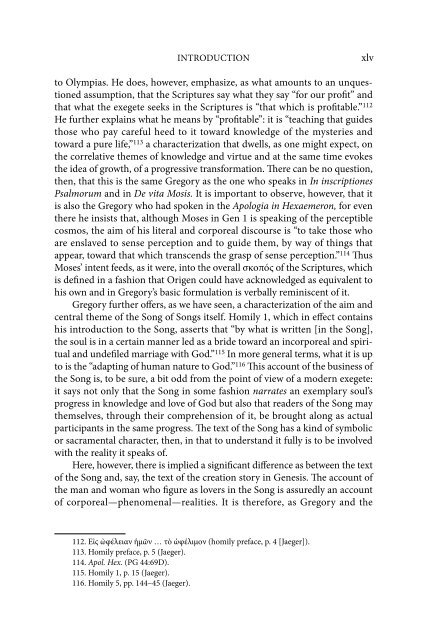gregory of nyssa: homilies on the song of songs - Society of Biblical ...
gregory of nyssa: homilies on the song of songs - Society of Biblical ...
gregory of nyssa: homilies on the song of songs - Society of Biblical ...
You also want an ePaper? Increase the reach of your titles
YUMPU automatically turns print PDFs into web optimized ePapers that Google loves.
INTRODUCTION xlv<br />
to Olympias. He does, however, emphasize, as what amounts to an unquesti<strong>on</strong>ed<br />
assumpti<strong>on</strong>, that <strong>the</strong> Scriptures say what <strong>the</strong>y say “for our pr<str<strong>on</strong>g>of</str<strong>on</strong>g>it” and<br />
that what <strong>the</strong> exegete seeks in <strong>the</strong> Scriptures is “that which is pr<str<strong>on</strong>g>of</str<strong>on</strong>g>itable.” 112<br />
He fur<strong>the</strong>r explains what he means by “pr<str<strong>on</strong>g>of</str<strong>on</strong>g>itable”: it is “teaching that guides<br />
those who pay careful heed to it toward knowledge <str<strong>on</strong>g>of</str<strong>on</strong>g> <strong>the</strong> mysteries and<br />
toward a pure life,” 113 a characterizati<strong>on</strong> that dwells, as <strong>on</strong>e might expect, <strong>on</strong><br />
<strong>the</strong> correlative <strong>the</strong>mes <str<strong>on</strong>g>of</str<strong>on</strong>g> knowledge and virtue and at <strong>the</strong> same time evokes<br />
<strong>the</strong> idea <str<strong>on</strong>g>of</str<strong>on</strong>g> growth, <str<strong>on</strong>g>of</str<strong>on</strong>g> a progressive transformati<strong>on</strong>. There can be no questi<strong>on</strong>,<br />
<strong>the</strong>n, that this is <strong>the</strong> same Gregory as <strong>the</strong> <strong>on</strong>e who speaks in In inscripti<strong>on</strong>es<br />
Psalmorum and in De vita Mosis. It is important to observe, however, that it<br />
is also <strong>the</strong> Gregory who had spoken in <strong>the</strong> Apologia in Hexaemer<strong>on</strong>, for even<br />
<strong>the</strong>re he insists that, although Moses in Gen 1 is speaking <str<strong>on</strong>g>of</str<strong>on</strong>g> <strong>the</strong> perceptible<br />
cosmos, <strong>the</strong> aim <str<strong>on</strong>g>of</str<strong>on</strong>g> his literal and corporeal discourse is “to take those who<br />
are enslaved to sense percepti<strong>on</strong> and to guide <strong>the</strong>m, by way <str<strong>on</strong>g>of</str<strong>on</strong>g> things that<br />
appear, toward that which transcends <strong>the</strong> grasp <str<strong>on</strong>g>of</str<strong>on</strong>g> sense percepti<strong>on</strong>.” 114 Thus<br />
Moses’ intent feeds, as it were, into <strong>the</strong> overall σκοπός <str<strong>on</strong>g>of</str<strong>on</strong>g> <strong>the</strong> Scriptures, which<br />
is defined in a fashi<strong>on</strong> that Origen could have acknowledged as equivalent to<br />
his own and in Gregory’s basic formulati<strong>on</strong> is verbally reminiscent <str<strong>on</strong>g>of</str<strong>on</strong>g> it.<br />
Gregory fur<strong>the</strong>r <str<strong>on</strong>g>of</str<strong>on</strong>g>fers, as we have seen, a characterizati<strong>on</strong> <str<strong>on</strong>g>of</str<strong>on</strong>g> <strong>the</strong> aim and<br />
central <strong>the</strong>me <str<strong>on</strong>g>of</str<strong>on</strong>g> <strong>the</strong> S<strong>on</strong>g <str<strong>on</strong>g>of</str<strong>on</strong>g> S<strong>on</strong>gs itself. Homily 1, which in effect c<strong>on</strong>tains<br />
his introducti<strong>on</strong> to <strong>the</strong> S<strong>on</strong>g, asserts that “by what is written [in <strong>the</strong> S<strong>on</strong>g],<br />
<strong>the</strong> soul is in a certain manner led as a bride toward an incorporeal and spiritual<br />
and undefiled marriage with God.” 115 In more general terms, what it is up<br />
to is <strong>the</strong> “adapting <str<strong>on</strong>g>of</str<strong>on</strong>g> human nature to God.” 116 This account <str<strong>on</strong>g>of</str<strong>on</strong>g> <strong>the</strong> business <str<strong>on</strong>g>of</str<strong>on</strong>g><br />
<strong>the</strong> S<strong>on</strong>g is, to be sure, a bit odd from <strong>the</strong> point <str<strong>on</strong>g>of</str<strong>on</strong>g> view <str<strong>on</strong>g>of</str<strong>on</strong>g> a modern exegete:<br />
it says not <strong>on</strong>ly that <strong>the</strong> S<strong>on</strong>g in some fashi<strong>on</strong> narrates an exemplary soul’s<br />
progress in knowledge and love <str<strong>on</strong>g>of</str<strong>on</strong>g> God but also that readers <str<strong>on</strong>g>of</str<strong>on</strong>g> <strong>the</strong> S<strong>on</strong>g may<br />
<strong>the</strong>mselves, through <strong>the</strong>ir comprehensi<strong>on</strong> <str<strong>on</strong>g>of</str<strong>on</strong>g> it, be brought al<strong>on</strong>g as actual<br />
participants in <strong>the</strong> same progress. The text <str<strong>on</strong>g>of</str<strong>on</strong>g> <strong>the</strong> S<strong>on</strong>g has a kind <str<strong>on</strong>g>of</str<strong>on</strong>g> symbolic<br />
or sacramental character, <strong>the</strong>n, in that to understand it fully is to be involved<br />
with <strong>the</strong> reality it speaks <str<strong>on</strong>g>of</str<strong>on</strong>g>.<br />
Here, however, <strong>the</strong>re is implied a significant difference as between <strong>the</strong> text<br />
<str<strong>on</strong>g>of</str<strong>on</strong>g> <strong>the</strong> S<strong>on</strong>g and, say, <strong>the</strong> text <str<strong>on</strong>g>of</str<strong>on</strong>g> <strong>the</strong> creati<strong>on</strong> story in Genesis. The account <str<strong>on</strong>g>of</str<strong>on</strong>g><br />
<strong>the</strong> man and woman who figure as lovers in <strong>the</strong> S<strong>on</strong>g is assuredly an account<br />
<str<strong>on</strong>g>of</str<strong>on</strong>g> corporeal—phenomenal—realities. It is <strong>the</strong>refore, as Gregory and <strong>the</strong><br />
112. Εἰς ὠφέλειαν ἡμῶν … τὸ ὠφέλιμον (homily preface, p. 4 [Jaeger]).<br />
113. Homily preface, p. 5 (Jaeger).<br />
114. Apol. Hex. (PG 44:69D).<br />
115. Homily 1, p. 15 (Jaeger).<br />
116. Homily 5, pp. 144–45 (Jaeger).
















